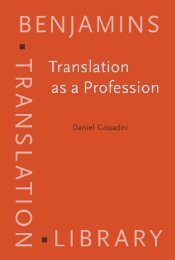Constructing a Sociology of Translation.pdf
Constructing a Sociology of Translation.pdf
Constructing a Sociology of Translation.pdf
- No tags were found...
Create successful ePaper yourself
Turn your PDF publications into a flip-book with our unique Google optimized e-Paper software.
13Hélène Buzelinthis theory, whose key concept is that <strong>of</strong> translation – understood in the sense<strong>of</strong> the transformation <strong>of</strong> an object during the course <strong>of</strong> an innovative process(Latour 1989: 172–194) – has found numerous fields <strong>of</strong> application. While originallyconceived to account for the way that science “is done” (Latour and Woolgar1988: 19), it has since been adapted to the study <strong>of</strong> numerous spheres <strong>of</strong> productionand power (other than those <strong>of</strong> knowledge) – from the functioning <strong>of</strong> privatebusinesses to the operation <strong>of</strong> financial markets and courts <strong>of</strong> law. I have alreadyexplored, in a previous article, Latour’s potential contribution to translation studies(Buzelin 2005). 1 At that stage, my argument was strictly theoretical. This essaypursues on a more concrete and applied level my reflections on this subject.Drawing upon the fieldwork I have been conducting for two years among threeMontréal-based independent publishers, I seek to better establish the originalityand limits <strong>of</strong> Latour’s thinking with regard to translation studies. More specifically,my aim is to demonstrate the interest and implications <strong>of</strong> a “sociology <strong>of</strong> translation”that would – not only, but also – take as its object <strong>of</strong> study a translation’sproduction process and integrate ethnography into its research methodologies.On Bruno Latour’s “sociology <strong>of</strong> translation”Bruno Latour’s theoretical work reflects two distinct phenomena that marked thesocial sciences during the same period – the 1970s: the repatriation <strong>of</strong> anthropologywithin so-called “modern” societies and the study <strong>of</strong> the relationships betweenknowledge and power. Interested in the sociology <strong>of</strong> sciences, Latour wasamong the first persons to cast an anthropological eye upon scientific practices,to study the processes <strong>of</strong> scientific and technical innovation in the field – what hecalls “la science en action” (1989). Why study science “being done” (Latour andWoolgar 1988: 19), rather than its breakthroughs, its institutions, its great figuresor its history? Quite simply, to better understand its mechanisms and social underpinnings,to avoid adopting visions that are too idealized or deterministic and,above all, to demonstrate to what extent “[cette] science ne se produit pas de façonplus scientifique que la technique de manière technique” (Latour 1997: 157).Latour’s approach proceeds from a two-part criticism <strong>of</strong> his contemporariessketched out in his first publications and stated more fully in his “Essaid’anthropologie symétrique” entitled Nous n’avons jamais été modernes(1997/1991). In his view, modernity is a mere illusion resting upon two complementarypractices: the production/multiplication <strong>of</strong> hybrids, or “quasi-objects” –1. This contribution can be epistemological, methodological or theoretical in nature, dependingupon how Latour is interpreted and appropriated.
















